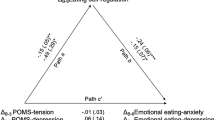Abstract
Purpose
This study aimed at assessing whether psychosocial predictors of controlled eating and weight loss also predict emotional eating, and how differing weight-loss treatment methods affect those variables.
Methods
Women with obesity (M = 47.8 ± 7.9 years; BMI = 35.4 ± 3.3 kg/m2) were randomized into groups of either phone-supported self-help (Self-Help; n = 50) or in-person contact (Personal Contact; n = 53) intended to increase exercise, improve eating behaviors, and reduce weight over 6 months.
Results
A multiple regression analysis indicated that at baseline mood, self-regulating eating, body satisfaction, and eating-related self-efficacy significantly predicted emotional eating (R 2 = 0.35), with mood and self-efficacy as independent predictors. Improvements over 6 months on each psychosocial measure were significantly greater in the Personal Contact group. Changes in mood, self-regulation, body satisfaction, and self-efficacy significantly predicted emotional eating change (R 2 = 0.38), with all variables except self-regulation change being an independent predictor. Decreased emotional eating was significantly associated with weight loss.
Conclusion
Findings suggest that weight-loss interventions should target specific psychosocial factors to improve emotional eating. The administration of cognitive-behavioral methods through personal contact might be more beneficial for those improvements than self-help formats.
Similar content being viewed by others
References
Kaplan HI, Kaplan H (1957) The psychosomatic concept of obesity. J Nerv Ment Dis 125:181–200
Ganley R (1989) Emotion and eating in obesity: a review of the literature. Int J Eat Disord 8:343–361
Allison DB, Heshka S (1993) Emotion and eating in obesity? A critical analysis. Int J Eat Disord 13:289–295. doi:10.1002/1098-108X(199304)13:3<289:AID-EAT2260130307>3.0.CO;2-X
McElroy SL, Kotwal R, Malhotra S, Nelson EB, Keck PE, Nemeroff CB (2004) Are mood disorders and obesity related? A review for the mental health professional. J Clin Psychiatry 65:634–651
Baker CW, Brownell KD (2000) Physical activity and maintenance of weight loss: physiological and psychological mechanisms. In: Bouchard C (ed) Physical activity and obesity. Human Kinetics, Champaign, pp 311–328
Annesi JJ (2012) Supported exercise improves controlled eating and weight through its effects on psychosocial factors: extending a systematic research program toward treatment development. Permanente J 16(1):7–18. doi:10.7812/TPP/11-136
Mann T, Tomiyama J, Westling E, Lew AM, Samuels B, Chatman J (2007) Medicare’s search for effective obesity treatments: diets are not the answer. Am Psychol 62:220–233. doi:10.1037/0003-066X.62.3.220
Bandura A (1986) Social foundations of thought and action: a social cognitive theory. Prentice Hall, Englewood Cliffs
Bandura A (1997) Self-efficacy: the exercise of control. Freeman, New York
Brownell KD (2004) The LEARN program for weight management, 10th edn. American Health Publishing, Dallas
Cooper Z, Doll HA, Hawker DM, Byrne S, Bonner G, Eeley E et al (2010) Testing a new cognitive behavioural treatment for obesity: a randomized controlled trial with three-year follow-up. Behav Res Ther 48:706–713. doi:10.1016/j.brat.2010.03.008
Annesi JJ, Unruh JL, Marti CN, Gorjala S, Tennant G (2011) Effects of The Coach Approach intervention on adherence to exercise in obese women: assessing mediation of social cognitive theory factors. Res Q Exerc Sport 82:99–108. doi:10.1080/02701367.2011.10599726
Arnow B, Kenardy J, Agras WS (1995) The emotional eating scale: the development of a measure to assess coping with negative affect by eating. Int J Eat Disord 18:79–90. doi:10.1002/1098-108X(199507)18:1<79:AID-EAT2260180109>3.0.CO;2-V
McNair DM, Heuchert JWP (2009) Profile of mood states technical update. Multi-Health Systems, North Tonawanda
Saelens BE, Gehrman CA, Sallis JF, Calfas KJ, Sarkin JA, Caparosa S (2000) Use of self-management strategies in a 2-year cognitive-behavioral intervention to promote physical activity. Behav Ther 31:365–379. doi:10.1016/S0005-7894(00)80020-9
Annesi JJ, Marti CN (2011) Path analysis of cognitive-behavioral exercise treatment-induced changes in psychological factors leading to weight loss. Psychol Health 26:1081–1098. doi:10.1080/08870446.2010.534167
Cash TF (1994) The multidimensional body-self relations questionnaire users’ manual. Old Dominion University, Norfolk
Clark MM, Abrams DB, Niaura RS, Eaton CA, Rossi JS (1991) Self-efficacy in weight management. J Consult Clin Psychol 59:739–744. doi:10.1037/0022-006X.59.5.739
Schafer JL, Graham JW (2002) Missing data: our view of the state of the art. Psychol Methods 7:147–177. doi:10.1037/1082-989X.7.2.147
Cohen J, Cohen P, West SG, Aiken LS (2003) Applied multiple regression/correlation analysis for the behavioral sciences, 3rd edn. Earlbaum, Mahwah
Glymour MM, Weuve J, Berkman LF, Kawachi I, Robins JM (2005) When is baseline adjustment useful in analyses of change? An example with education and cognitive change. Am J Epidemiol 162:267–278. doi:10.1093/aje/kwi187
Vohs KD, Baumeister RF (2004) Handbook of self-regulation: research, theory, and application, 2nd edn. Guilford, New York
Annesi JJ (2010) Relations of changes in self-regulatory efficacy and physical self-concept with improvements in body satisfaction in obese women initiating exercise with cognitive-behavioral support. Body Image 7:356–359. doi:10.1016/j.bodyim.2010.05.001
Annesi JJ, Porter KJ (2013) Reciprocal effects of treatment-induced increases in exercise and improved eating, and their psychosocial correlates, in obese adults seeking weight loss: a field-based trial. Int J Behav Nutr Phys Act 10:133. http://www.ijbnpa.org/content/pdf/1479-5868-10-133.pdf. doi:10.1186/1479-5868-10-133
Teixeira PJ, Carraça EV, Marques MM, Rutter H, Oppert J-M, De Bourdeaudhuij I et al (2015) Successful behavior change in obesity interventions in adults: a systematic review of self-regulation mediators. BMC Med 13:84. http://www.biomedcentral.com/content/pdf/s12916-015-0323-6.pdf. doi:10.1186/s12916-015-0323-6
Green LW, Sim L, Breiner H (eds) (2013) Evaluating obesity prevention efforts: a plan for measuring progress. Institute of Medicine of the National Academies, Washington, DC
Author information
Authors and Affiliations
Corresponding author
Ethics declarations
Conflict of interest
For this study the authors declare no conflicts of interest.
Ethical approval
The authors certify that this research complied with ethical standards consistent with the Helsinki declaration.
Informed consent
Institutional review board approval and written informed consent from each participant was received.
Rights and permissions
About this article
Cite this article
Annesi, J.J., Mareno, N. & McEwen, K. Psychosocial predictors of emotional eating and their weight-loss treatment-induced changes in women with obesity. Eat Weight Disord 21, 289–295 (2016). https://doi.org/10.1007/s40519-015-0209-9
Received:
Accepted:
Published:
Issue Date:
DOI: https://doi.org/10.1007/s40519-015-0209-9




